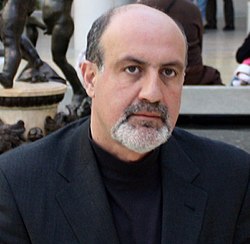Nassim Nicholas Taleb Quote
Let us return to the distinction between Thalesian and Aristotelian for a minute and look at evolution from the following point of view. The frequency, i.e., how often someone is right is largely irrelevant in the real world, but alas, one needs to be a practitioner, not a talker, to figure it out. On paper, the frequency of being right matters, but only on paper—typically, fragile payoffs have little (sometimes no) upside, and antifragile payoffs have little downside. This means that one makes pennies to lose dollars in the fragile case; makes dollars to lose pennies in the antifragile one. So the antifragile can lose for a long time with impunity, so long as he happens to be right once; for the fragile, a single loss can be terminal. Accordingly if you were betting on the downfall of, say, a portfolio of financial institutions because of their fragilities, it would have cost you pennies over the years preceding their eventual demise in 2008, as Nero and Tony did. (Note again that taking the other side of fragility makes you antifragile.) You were wrong for years, right for a moment, losing small, winning big, so vastly more successful than the other way (actually the other way would be bust). So you would have made the Thekels like Thales because betting against the fragile is antifragile. But someone who had merely predicted the event with just words would have been called by the journalists wrong for years, wrong most of the time, etc. Should we keep tally of opinion makers’ right and wrong, the proportion does not matter, as we need to include consequences. And given that this is impossible, we are now in a quandary. Look at it again, the way we looked at entrepreneurs. They are usually wrong and make mistakes—plenty of mistakes. They are convex. So what counts is the payoff from success.
Let us return to the distinction between Thalesian and Aristotelian for a minute and look at evolution from the following point of view. The frequency, i.e., how often someone is right is largely irrelevant in the real world, but alas, one needs to be a practitioner, not a talker, to figure it out. On paper, the frequency of being right matters, but only on paper—typically, fragile payoffs have little (sometimes no) upside, and antifragile payoffs have little downside. This means that one makes pennies to lose dollars in the fragile case; makes dollars to lose pennies in the antifragile one. So the antifragile can lose for a long time with impunity, so long as he happens to be right once; for the fragile, a single loss can be terminal. Accordingly if you were betting on the downfall of, say, a portfolio of financial institutions because of their fragilities, it would have cost you pennies over the years preceding their eventual demise in 2008, as Nero and Tony did. (Note again that taking the other side of fragility makes you antifragile.) You were wrong for years, right for a moment, losing small, winning big, so vastly more successful than the other way (actually the other way would be bust). So you would have made the Thekels like Thales because betting against the fragile is antifragile. But someone who had merely predicted the event with just words would have been called by the journalists wrong for years, wrong most of the time, etc. Should we keep tally of opinion makers’ right and wrong, the proportion does not matter, as we need to include consequences. And given that this is impossible, we are now in a quandary. Look at it again, the way we looked at entrepreneurs. They are usually wrong and make mistakes—plenty of mistakes. They are convex. So what counts is the payoff from success.
Related Quotes
About Nassim Nicholas Taleb
Taleb is the author of the Incerto, a five-volume work on the nature of uncertainty published between 2001 and 2018 (notably, The Black Swan and Antifragile). He has taught at several universities, serving as a Distinguished Professor of Risk Engineering at the New York University Tandon School of Engineering since September 2008. He has also been a practitioner of mathematical finance and is currently an adviser at Universa Investments. The Sunday Times described his 2007 book The Black Swan as one of the 12 most influential books since World War II.
Taleb criticized risk management methods used by the finance industry and warned about financial crises, subsequently profiting from the Black Monday (1987) and the 2008 financial crisis. He advocates what he calls a "black swan robust" society, meaning a society that can withstand difficult-to-predict events. He proposes what he has termed "antifragility" in systems; that is, an ability to benefit and grow from a certain class of random events, errors, and volatility, as well as "convex tinkering" as a method of scientific discovery, by which he means that decentralized experimentation outperforms directed research.
